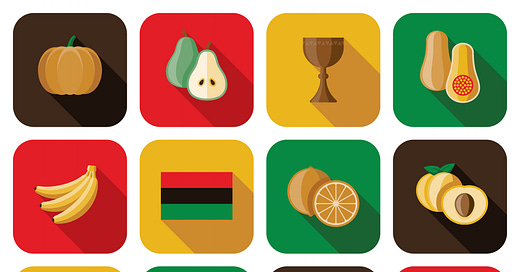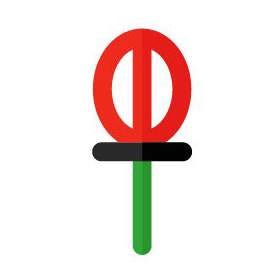Happy New Year! Coming in hot and right on CP time, is the final installment of Tiny Violences’ Kwanzaa series. Thank you for your engagement, thoughtful notes, messages and emojis.
The final days of Kwanzaa, days six and seven are symbolized by the concepts of Creativity or Kuumba and Faith or Imani. Kwanzaa’s founder intended for these two days to follow in sequence after the day of Purpose, Nia. On New Year’s day I began to craft and think about these days in succession but decided not to write about it. My intention was to meditate on what a New Year might mean for me, as someone who is trying to meaningfully engage with Kwanzaa as an act of liberation (and also I took a three hour nap during my scheduled writing time). The first thing that came to me was to explore the ideas of creativity to help me understand how this concept could be and should be intertwined with acts of faith.
Kwanzaa is meant to be a unifying secular activity for Black folks, there is however an amalgam of continental African religion that is deeply tied to the imagination that conceived of this holiday. Creativity is posited as something immaterial, and though Karenga contradicts himself with countless references to a or the Creator, I do believe as do many that a life of creativity is one that is spiritual. Ideas, philosophy, art, and actual human life are the manifold examples of the shuttling of creativity from the dreamscape to the tangible world.
Kuumba as articulated by Karenga is about taking action towards the revitalization of the Black community. To do always as much as we can, in the way we can, in order to leave our community more beautiful and beneficial than we inherited it. The symbol assigned to the sixth day of Kwanzaa is the Dogon symbol of creativity, rendered as what reminds me of the kinds of suns drawn in childhood, a small dot at the center of seven rays of ascending lengths, reaching out towards the earth and the heavens. A lot of the source material for this day and its meaning have been gleaned from pre-colonial Egyptian text and lore, and frankly was lost on me because I’m not in the mind that we should be venerating oligarchies, no matter how Black they were. But the emphasis of on creative restoration resonates strongly with my personal desires for Black futurity.
The source materials for much of what we do, invent, and perpetuate as a heterogeneous [Black] culture lives in history and of the ether, meaning to quote Lauryn Hill’s Lost Ones “everything you did has already been done.” We cannot truly measure the impact of global imperialism and the cultural costs of settler-colonialism as manifested through chattel slavery. What we do know is that the obfuscation of our connection to source (Black indigeneity) has us tapping into ancestral memory to both reclaim and reinvent what may have already existed. I see this most clearly expressed in the many inventions of music, stemming from then ancient drums; it is palpable in the food we eat, the dances we do, the ways we craft our unique tongues despite attempts to be bound by the languages of oppression, our storytelling, even down to how we keep our homes and treasure our objects. A lot of what Kwanzaa’s principles are based on, seem to be pointing towards loss, this is valid, but I believe it leaves little room for the expansive reality of what loss creates: opportunity.
Since our ancestors set foot on this land, even before then, when first entering into the chains of bondage something new was happening, and in that unimaginable pain the lives that we know globally have been forever transformed. The hybridization of African languages, traditions, storytelling, care, community was forced upon our folks during the long trek towards another hemisphere. Once we landed, in the midst of terror we begin to create and recreate culture meant to protect the agency we had left, the internal mechanisms of consciousness or what the religious might consider a soul. Creativity is a founding principle of human life, but in the context of Black life it is the cornerstone of our identities and is something that should not be taken for granted.
A lot of how creativity has been bastardized is through lenses of industry. It is important for Black people to remember that our souls, our creative impulses are not always for sale, not meant to be exploited, interpolated for mass consumption nor are they meant to be left unexpressed, that there is room for our creative output, and that that expression is not always tangible (or prolific, for that matter). On the sixth day of Kwanzaa I thought to myself What better way to find restoration than through creativity, what better way to think about creativity than as a natural impulse to express our connections to our ancestors and to create spaces for those who have yet to be. There is so much that has been lost because of the complicated legacy of my ancestry as an African in this new world, but there is so much to restore and create.
It's been a week since we all counted down from 10 and gave out kisses, hugs, grapes, coins, dollars, collard greens, black eyed peas and the like. Coming into year three of a global pandemic with my family intact, and most of my friends and communities unscathed by the morbid reality of the time was one for reflections of deep gratitude. I’ve had some time to distance myself from all the New Year Me BS, all the marketing for diet and exercise, and all the high stakes superstitions around how to correctly usher in the new year. I will share a little later what I actually did to ring in the new year.
New Year’s Day, Imani, is the seventh and final day of the African diasporic holiday of Kwanzaa. As mentioned earlier, I started to tap out a missive, with the urgency of the collective momentums many Westerners feel around the start of the year. But I had to question why? I didn’t feel that rush of joy, the feelings often portrayed in sentimental films and TV shows, nor did I feel the call to write down all the things I wish to resolve this year.
Imani is: To believe with all our heart in our people, our parents, our teachers, our leaders and the righteousness and victory of our struggle. The ancient Egyptian double symbol of the ankh (life) and djed pillar (stability, endurance) serves here as a symbol of steadfastness in commitment to the Good, the Right, and the Beautiful in life. Imani is meant to bookend the first principle of Umoja or unity. It seems though that, this concept is left without the crucial aspect of discernment. I think it is important to think of our people as good and as beautiful, and it’s radical in response to the bombardment of images, messages, social and cultural policies that reinforce the opposite. I also know (hence this Kwanzaa series) that the interrogation of those who assign themselves as leaders or those who have found themselves in leadership positions is crucial. It’s imperative for us to have intellectual systems of introspection that respectfully allow the questioning of our histories, beliefs, rituals, traditions, and cultures. I think this process brings us closer to the cultural fortification Kwanzaa was meant for.
The pan-African, pseudo-Black nationalist internet is wild these days, so many folks with so many disparate and outright wrong/illogical/fantastical theories are swarming around, in an attempt (I hope) to find some grounding in the chaos of the world. But few are willing to call into question the blatant rebranding of colonial and oligarchic thought. Trans-hate, homophobia, misogynoir, colorism, classism, ableism, are being distilled through a so-called Black liberationist angle, and it’s being packaged in very digestible rhetoric. And sadly, many of the concepts, ideas and philosophies that are being born from the brilliance of Black minds – that would easily counteract these crazed ideas – are often armored in academic language, creating barriers for those who will benefit from it most.
Growing up in urban poverty, there were so many concepts that I lived, felt, and experienced that I had trouble naming. Coming to theory helped me to resolve the gaslighting the white and monied world around me attempted to do to my experience. Yet so many of my peers didn’t have the time or interest in many of the complicated inroads to this information. Inroads being expensive universities, white centered (and/or funded) community-based organizations, academic texts, (sometimes and lets be real here) boring talks and documentaries. If some of us hadn’t been groomed early in our childhoods to seek out differences, to have curiosities outside of our lines of sights, to know even that there was a periphery, where would we be? I know now, that the few do the work for the many. There have been so many Black theorist who have helped unlock what I’ve experienced in my life and left me with the kind of self-determination that breathed life into the creative aspects of my existence. To name a few: bell hooks, Angela Y. Davis, Audre Lorde, Édouard Glissant, Claudia Tate, Alice Walker, Hortense Spillers, Sylvia Wynter, Christina Sharpe, Saidiya Hartman, James Baldwin, and countless more contemporary minds on Twitter and Instagram. My Kwanzaa wish for the new year is that more of us take on the responsibilities of the few.
What if I felt responsible for a Black future? What if how I imagine liberation was not only valid, what if I could build a pathway towards a horizon? What if I decided to think expansively about my so-called marginalized identities and found freedom in those possibilities? What could I create if liberation was truly my praxis? Where can I make joyful commitment to my future selves, to the future of my peoples? How can I carefully reflect on my choices? How can I be accountable for the mistakes I will undoubtedly make? How can I minimize harm? How can I delegitimize the negative and anti Black/queer/dark skinned/fat/poor beliefs that I’ve internalized?
I’ve been imagining how Kwanzaa can propel Black people towards a life of liberation – that these concepts of Unity, Self Determination, Collective Work & Responsibility, Cooperative Economics, Purpose, Creativity and Faith; are imagined and reimagined to support those of us that are most marginalized on our many intersections. There is so much promise in these vast yet abstract concepts and I’m grateful to have them. In time we can legitimize this holiday for ourselves, that we can divorce the need to suture it to the corporate interests of the other celebrations of the season and can find time to make it our own. I encourage you to reflect on these principles all year, and prepare for your own Kwanzaa celebrations this coming season.
Thank you for rocking with me and my Kwanzaa musings! The New Year doesn’t start for me til February (Black history month), but I’m curious about what you’re thinking about for 2023. Let me know in the comments or leave me some 🎉🎉🎉 to celebrate with me.








“What if how I imagine liberation was not only valid, what if I could build a pathway towards a horizon?”
Because it is. And I can. And I am. That’s what I’m resting in on 2023.
And cheers to your 3 hr nap -- there’s a practice worth celebrating in the face of creative capitalism. ❤️
Thank you for celebrating and challenging Kwanzaa, Jet
So much to unpack. My key moment was this, "rebranding of colonial and oligarchic thought". We really have to dig deeper because indeed, these musings are a regurgitation of internal struggles.
The beauty of this article and in my existence is the ability to challenge, research and then reimagine what I can incorporate into my belief system so that I can build a future for myself that honors my own life. Thinking of "Nia" as I move into 2023 and meditating about what I am truly here for.